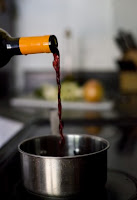
Over the past few months I have been adding wine to my recipes...ALOT! Lately I have been cooking lots of tasty dishes from Julia Child's Mastering the art of French cooking and Barbara Lynch's Stir not ever realizing how much wine actually goes into these fantastic dishes. I found while reading the recipes it was hard to decide what kind of wine to use. When a recipe calls for dry white wine which should I choose? As I was researching i found some great tips from cookinglight.com. The article pairs flavors with the wine to help make your decision easier. Before I continue I need to stress one point...ONLY COOK WITH WHAT YOU WOULD DRINK! Ive watched people dump the "white cooking wine" from the 4Th shelf in a grocery food aisle into the pot and thought to myself hmmm that looks tasty. Please stay away from the grocery aisle wine that looks like it was made by a ketchup vendor. I will often share a bottle of wine with my creation, toasting what will hopefully be an awesome dish and if its not I rest my laurels on the fantastic glasses of wine I have sipped throughout the process. For example 2 nights ago I made Boeuf Bourguignon a la Julia Child and used a great 90 point Chianti. I found and with 3/4 of that bottle devoted to my masterpiece I was able to enjoy a couple glass while I cooked (he recipe and the art of creativity in cooking always becomes clearer to me after a glass or two). Cooking should be fun not stressful and as I have said in past blogs choosing the right wine whether you are drinking it or cooking with it or both should be just as much fun!
Here are guidelines from cookinglight.com to help you make the best pick:
If a recipe calls for dry white wine, the best all-around choice is a quality American Sauvignon Blanc.
This wine will be very dry and offer a fresh light herbal tilt that will enhance nearly any dish.
If the dish has bold or spicy flavors, go for a more aromatic white wine.
Gewurztraminer, Riesling, and Viognier all have dynamic fruity flavors and exotic floral aromas that counterbalance heavily spiced dishes.
If a recipe calls for dry red wine, consider the heartiness of the dish.
A long-simmered leg of lamb or beef roast calls for a correspondingly hearty wine, such as a Petite Syrah or a Zinfandel. A lighter dish might call for a less powerful red―think Pinot Noir or Chianti.
Get to know Port, Sherry, Madeira, and Marsala.
These are among the best wines good cooks can have on hand. They pack the most intense flavors and―because they're fortified with a little more alcohol than table wine―have the longest life on the pantry shelf.
• Port has a rich sweetness and depth that's especially good in meat-based casseroles.
• Sherry's complex roasted nutty flavors can enhance just about any soup, stew, or sautèed dish. Two styles of Sherry that work best are Amontillado or Oloroso.
• Madeira can be mesmerizingly lush with toffee-caramel notes. Use the medium-rich style known as Bual, a touch of which will transform ordinary sautèed mushrooms. And Marsala's light caramel-like fruitiness is an integral part of Mediterranean sautès, many of which bear the wine's name in their titles.
Lastly, a few of my favorite recipes that call for cooking with a great wine:
http://www.foodandwine.com/recipes/tuscan-style-lasagna
http://www.foodandwine.com/recipes/pappardelle-with-tangy-veal-ragu
http://www.recipezaar.com/Boeuf-Bourguignon-a-La-Julia-Child-148007
Drink & cook well!
-a